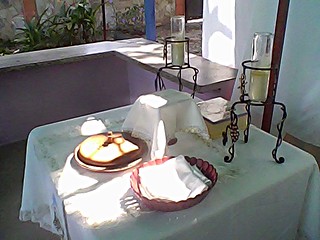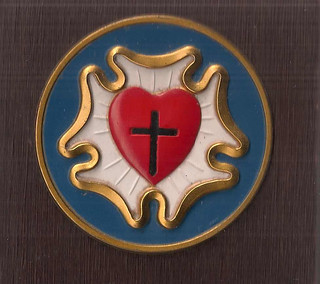 |
| But, lo, there breaks a yet more glorious day; The saints triumphant rise in bright array. The King of Glory passes on His way. Alleluia! Alleluia! The Lutheran Hymnal No. 463 |
We celebrated Reformation Day on Sunday, October 25. This is the recommended rubric:
If the Feast of the Reformation is observed on Sunday, it should be the Sunday before October 31 in order to be allow for a similar celebration of All Saints Day the Sunday on or after 1 November. (Fred H. Lindemann (The Sermons and The Propers IV: Trinity Season - Second Half. St. Louis: Concordia Publishing House, 1958. p. 134-135)
In addition, we expected good attendance on October 25, better than we might have had on Saturday, October 31. We did indeed have good attendance on the 25th. Since the celebration of the Reformation is not something that should be overlooked, we decided to observe it on the day when the larger number of people would be present.
To talk about these dates on our church calendar, Oct. 31 and Nov. 1, is a little tricky because of strong "anti-Halloween" sentiment in certain quarters of Venezuela. There is much of the same "Halloween is a pagan holiday" propaganda here that you might encounter in the United States. It is spread by the same kind of "evangelical" sects who are either unaware of the Christian origin of All Saints Eve and All Saints Day, or see it as something Roman Catholic. Because Venezuela is not the country of the "middle way"; People here are either traditionalist Catholics, with their veneration of the saints, or sectarions who want to throw out all of the traditions of the ancient church altogether.
Not only that, but in Venezuela there is an element of anti-United States feeling in the anti-Halloween movement. Halloween, as we North Americans know it, is a foreign holiday here (and, in fact, many of the customs that we associate with Halloween (or All Hallows Eve), such as jack o'lanterns or trick or treating, really got started in the United States, although with roots in the cultural heritage of immigrants.
 |
| This giant squash is of a different species than the North American pumpkin, but is similar. |
I like to tell Luz Maria about how much fun I had carving faces in pumpkins while growing up in a thoroughly Lutheran community. Nobody thought that carving jack o'lanterns had anything to do with witchcraft back then. First I would carve an opening on top and remove the stuff inside the pumpkin. That was not the most pleasant part, but later my mother would make a pumpkin pie out of the material.
In fact, pumpkins are native to North America and American Indians were baking pumpkin pies before any European settlers showed up. After the discovery of the New World by Christopher Columbus, the Irish adapted an old custom of carving out turnips to place a lighted candle inside to serve as a lantern. Irish immigrants brought the custom of carving pumpkins to the United States, and in the early 1800s, making jack o'lanterns for Halloween "went viral" as we would say now.
But there is a problem with Halloween, although it is not the supposed pagan origin of jack o'lanterns and the like. Like Christmas, Halloween has become big business and the Christian significance of it has largely been forgotten. Halloween as it has been exported to Venezuela is scary, with all the emphasis on vampires, zombies, etc. And witchcraft is not make-believe in Venezuela. Christians in Venezuela must struggle to free themselves from occult practices that are commonplace.
However, as Lutherans we have an advantage in that Martin Luther chose October 31 to post the 95 Theses on the door of All Saints Church in Wittenberg, Germany. This was not by accident. In the 95 Theses Luther dealt with the destiny of human souls, which would have been on everyone's minds during the festival of All Saints.
 |
| Thou was their Rock, their Fortress and their Might, Thou, Lord, their Captain, in the well-fought fight. Thou, in the darkness drear, their one true Light. Alleluia! Alleluia! TLH No. 463 |
All Saints Day was first observed in the fourth century A.D., in the part of the world we know today as Turkey and Syria. There had been so many martyrs to the faith in the first 300 years of the Christian era that there were not enough dates on the calendar to devote a day to remembering each one on a separate day. So one day was chosen to honor all the martyrs, later all those who had died in the faith (the saints in heaven). It seems that All Saints Day at first was celebrated on the first Sunday after Pentecost, and this still is the date on which it is observed in most Greek Orthodox churches.
However, around 610 A.D, Pope Boniface IV changed the date to November 1 for the church of western Europe (the Orthodox churches of eastern Europe and Asia officially rejected the primace of the Pope in 1054 A.D.). Pope Boniface IV wanted the dedication of a church in Rome to be a special occasion. The celebration of All Saints eventually would include the evening of October 31 and the day of Nov. 2.
We Lutherans also reject the primacy of the Pope, yet we continue the custom of observing All Saints Day on Nov. 1 because of the importance of Luther's posting the 95 Theses on the eve of All Saints. For us, All Saints simply continues the theme of Reformation Day.
In his 95 Theses, Luther challenged Roman doctrine on penance and purgatory. Eventually he would reject Rome's definition of sainthood. The saints are not those who by their own merits have left purgatory and entered into the presence of GodThe Bible teaches us that all who believe in Jesus Christ are saints. What do we confess in the Apostles' Creed? We believe in the holy Christian Church, the communion of saints. The holy Christian church is the same as the communion of saints. The church is all who have been baptized in the name of the Father, the Son and the Holy Spirit, and in sincere faith receive the body and blood of Christ in the Lord's Supper. They are the saints of God..
Among us Lutherans we speak of the heroes of faith as saints, for example, St. Matthew, St. Paul, St. Luke or St. John. They are holy. We recognize them as models for us. We also speak of those who died in the faith as saints and honor them on this day. As our text for today says, the saints in heaven are they which came out ofthe great tribulation. What is the great tribulation? Life in this world, because in this life are sufferings, trials and difficulties. The saints in heaven have passed beyond all these things. As John says, now they do not hunger or thirst, or feel heat or pain. They live forever with Christ as the reward for their faith. They are at rest and peace with Christ. Therefore, we honor, but not pray to or worship them. We have one Mediator between God and us in Christ and do not need another. Amen




No comments:
Post a Comment